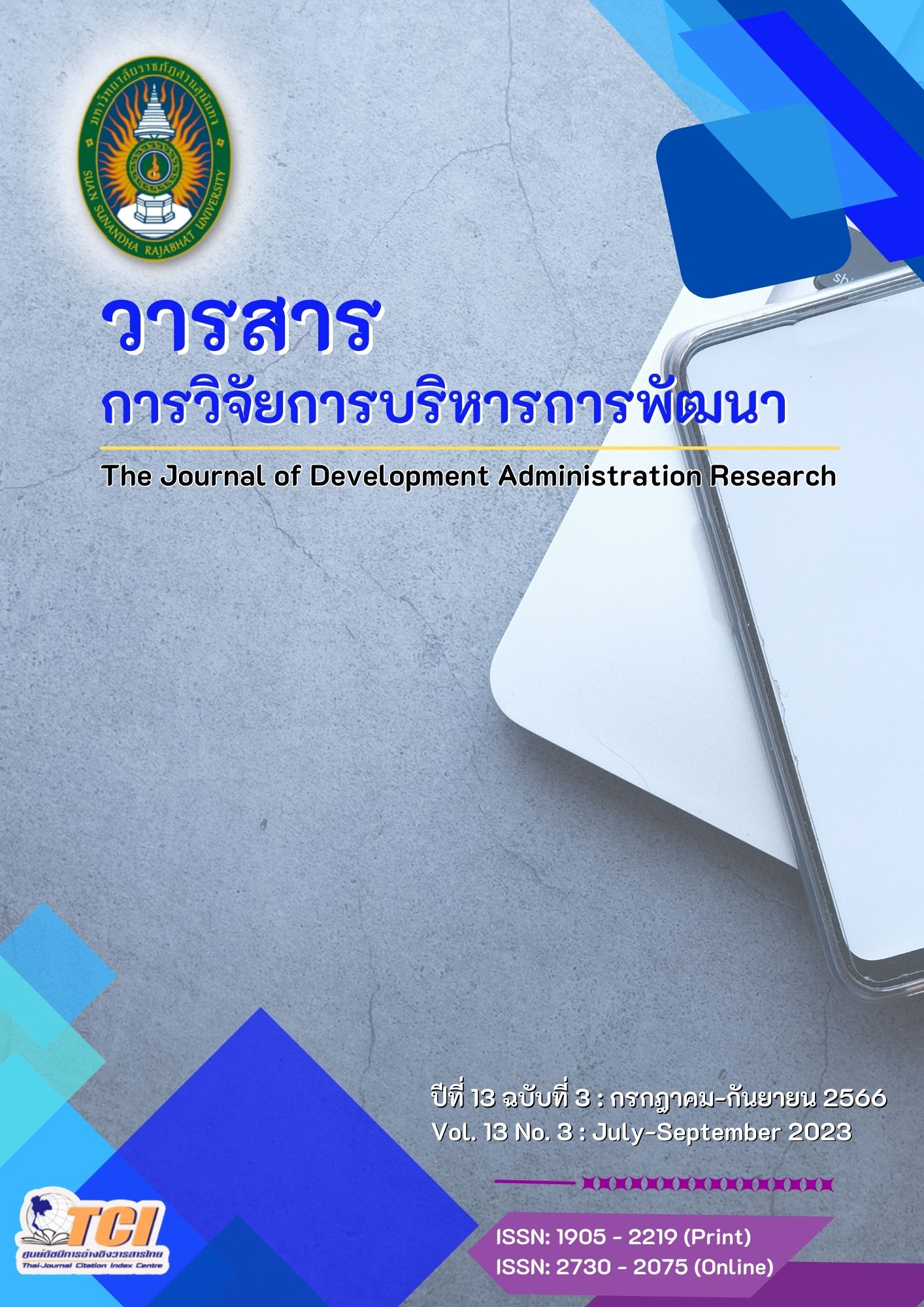ปัจจัยเชิงสาเหตุของความสามารถเผยแผ่พระพุทธศาสนาในต่างประเทศ ที่ส่งผลต่อผลการดำเนินงานองค์กร
คำสำคัญ:
ความเป็นผู้นำ, การเรียนรู้, การฝึกอบรม, ความสามารถเผยแพร่พระพุทธศาสนา, ผลการดำเนินงานขององค์การบทคัดย่อ
การศึกษาครั้งนี้มีวัตถุประสงค์เพื่อ 1) ศึกษาปัจจัยเชิงสาเหตุที่ส่งผลต่อความสามารถเผยแผ่พระพุทธศาสนาในต่างประเทศและผลการดำเนินงานองค์กร, 2) ศึกษาอิทธิพลของปัจจัยเชิงสาเหตุของความสามารถเผยแผ่พระพุทธศาสนาในต่างประเทศที่ส่งผลต่อผลการดำเนินงานองค์กร และ 3) พัฒนาแบบจำลองของปัจจัยเชิงสาเหตุของความสามารถเผยแผ่พระพุทธศาสนาในต่างประเทศที่ส่งผลต่อผลการดำเนินงานองค์กร ใช้วิธีวิจัยแบบผสานวิธี คือการวิจัยเชิงปริมาณเก็บรวบรวมข้อมูลด้วยแบบสอบถามจากกลุ่มตัวอย่าง คือ พระธรรมทูตสายต่างประเทศ จำนวน 27 รุ่น จำนวน 500 คน และการวิจัยเชิงคุณภาพ
เก็บข้อมูลด้วยการสัมภาษณ์จากผู้ให้ข้อมูลสำคัญคือผู้บริหารองค์กรพระธรรมทูต เจ้าอาวาส อาจารย์ประจำวิทยาลัยพระธรรมทูต จำนวน 6 ราย และใช้วิธีการวิเคราะห์เชิงเนื้อหา
ผลการศึกษาพบว่า 1) ปัจจัยเชิงสาเหตุด้านความเป็นผู้นำส่งผลต่อความสามารถเผยแผ่พระพุทธศาสนา, ความเป็นผู้นำส่งผลต่อการดำเนินงานขององค์กรผ่านความสามารถเผยแผ่พระพุทธศาสนา, การเรียนรู้ส่งผลต่อความสามารถเผยแผ่พระพุทธศาสนา, 2) ปัจจัยเชิงสาเหตุด้านการเรียนรู้มีอิทธิพลต่อการดำเนินงานขององค์กรผ่านความสามารถเผยแผ่พระพุทธศาสนา, การฝึกอบรมส่งผลต่อความสามารถเผยแผ่พระพุทธศาสนา และ 3) แบบจำลองของปัจจัยเชิงสาเหตุที่ส่งผลต่อผลการดำเนินงานขององค์กรผ่านความสามารถเผยแผ่พระพุทธศาสนาและความสามารถเผยแผ่พระพุทธศาสนาส่งผลต่อผลการดำเนินงานขององค์กรประกอบด้วยความเป็นผู้นำ และการเรียนรู้ ดังนั้น เจ้าอาวาสวัดในต่างประเทศอาจกำหนดแนวทางการเสริมสร้างการเป็นผู้นำและเสริมสร้างการเรียนรู้เพื่อพัฒนาพระธรรมทูตสายต่างประเทศ และวัดในต่างประเทศ อันจะเป็นประโยชน์ต่อองค์กระพระธรรมทูต และชาวต่างชาติที่สนใจในการศึกษาพระธรรมคำสั่งสอนของพระพุทธเจ้า
เอกสารอ้างอิง
Abdul Aziz, S. F., & Selamat, M. N. (2016). Stimulating Workplace Learning through Training Characteristics and Motivation to Learn. Merangsang Pembelajaran di Tempat Kerja Menggunakan Ciri-ciri Latihan dan Motivasi Belajar, 48, 1-17.
Afsar, B. et al. (2020). Responsible leadership and employee's proenvironmental behavior: The role of organizational commitment, green shared vision, and internal environmental locus of control. Corporate Social Responsibility & Environmental Management, 27(1), 297-312.
Avital, M. (2005). Innovation in information systems education I: accelerated systems analysis and design with appreciative inquiry – An action learning approach. Communications of the Association for Information Systems, 15, 289-314.
Brzovic, K., & Matz, S. I. (2009). Students advise Fortune 500 company: Designing a problem-Based leraning community. Business Communication Quarterly, 72(1), 21-34.
Clelland, D. M. C. (1973). Testing for Competence Rather than for Intelligence. American Psychologist, 28(1),1-14.
Cheng, J., Bai, H., & Yang, X. (2019). Ethical Leadership and Internal Whistleblowing: A Mediated Moderation Model. Journal of Business Ethics, 155(1), 115-130.
Chubinski, J., Adcock, K., & Sprigg, S. (2019). Challenges and Opportunities in Philanthropic Organizational Learning: Reflections From Fellow Grantmakers. Foundation Review, 11(1), 62-80.
Ciulla, J. B., Knights, D., Mabey, C., & Tomkins, L. (2018). Philosophical Contributions to Leadership Ethics. Business Ethics Quarterly, 28(1), 1-14.
Daud, R., Ismail, M., & Omar, Z. (2010). Exploring Competencies. Professional Safety, 55(10), 39-47.
Dhammatuta College (2564). Certificate awarding ceremony for the 27th International Dhammaduta Bhikkhu Training Program. Retrieved October 10, 2022, from www.odc.mcu.ac.th/?cat=30
Edelbroek, R., Peters, P. & Blomme, R. J. (2019). Engaging in open innovation: The mediating role of work engagement in the relationship between transformational and transactional leadership and the quality of the open innovation process as perceived by employees. Journal of General Management, 45(1), 5-17.
Evans, W. R., Davis, W. D. & Neely, A. (2021). The Role of Organizational Cynicism and Conscientiousness in the Relationship between Ethical Leadership and Deviance. Journal of Managerial Issues, 33(1), 49-68.
Fletcher, L. (2016). Training perceptions, engagement, and performance: comparing work engagement and personal role engagement. Human Resource Development International, 19(1), 4-26.
Hair, J., Black, W., Babin, B., Anderson, R., & Tatham, R. (2006). Multivariate Data Analysis (6th ed.). Upper Saddle River, NJ: Pearson Prentice Hall.
Hauser, C. (2019). Fighting Against Corruption: Does Anti-corruption Training Make Any Difference? Journal of Business Ethics, 159(1), 281-299.
Helms, M. M. & Whitesell, M. (2017). Structuring assignments to improve understanding and presentation skills: Experiential learning in the capstone strategic management team presentation. Journal of Education for Business, 92(7), 332-346.
Jelaca, M. S., Karaatli, G., Bjekic, R. & Petrov, V. (2020). The Effects of Environment Uncertainty and Leadership Styles on Organisational Innovativeness. Engineering Economics, 31(4), 472-486.
Latif, K. F., Jan, S. & Shaheen, N. (2013). Association of Training Satisfaction with Employee Development aspect of Job Satisfaction. Journal of Managerial Sciences, 7(1), 159-178.
Marsh, C. (2013). Business Executives' Perceptions of Ethical Leadership and Its Development (01674544). Retrieved October 10, 2022, from http://search.ebscohost.com/login.aspx? direct=true&db=bth&AN=87846218&site=ehost-live
Phramaha Suthep Suwathano (Loathong). (2019). Strategies for Buddhism Propagation of Overseas Dhammaduta Bhikkhus. Journal of MCU Nakhondhat, 6(3), 1363-1378.
Pless, N., & Maak, T. (2011). Responsible Leadership: Pathways to the Future. Journal of Business Ethics, 98, 3-13.
Sanusi, S. I., Adedoyin, I. S., & Ishola, J. A. (2021). Effects of Training on Academic Staff Performance in Kwara State Polytechnic, Ilorin. PRERANA: Journal of Management Thought & Practice, 13(1), 11-21.
Smallwood, M. W., & Jasper, C. R. (2020). Teaching Civic Engagement Through Student Philanthropy: Theories and Best Practices for Transformative Learning. Journal of Nonprofit Education & Leadership, 10(3), 262-287.
Taylor, P. A. (1985). Institutional job training and inequality. Social Science Quarterly (University of Texas Press), 66(1), 67-78.
Uddin, K. S. (2017). A Study on the Impact of Employee Training and Stimulus on Business Recital with Indication to Public and Private Banks of India. Adhyayan: A Journal of Management Sciences, 7(2), 82-89.
ดาวน์โหลด
เผยแพร่แล้ว
รูปแบบการอ้างอิง
ฉบับ
ประเภทบทความ
สัญญาอนุญาต
ลิขสิทธิ์ (c) 2023 วารสารการวิจัยการบริหารการพัฒนา

อนุญาตภายใต้เงื่อนไข Creative Commons Attribution-NonCommercial-NoDerivatives 4.0 International License.
บทความที่ได้รับการตีพิมพ์เป็นลิขสิทธิ์ของมหาวิทยาลัยราชภัฏสวนสุนันทา
ข้อความที่ปรากฏในบทความแต่ละเรื่องในวารสารวิชาการเล่มนี้เป็นความคิดเห็นส่วนตัวของผู้เขียนแต่ละท่านไม่เกี่ยวข้องกับมหาวิทยาลัยราชภัฏสวนสุนันทา และคณาจารย์ท่านอื่นๆ ในมหาวิทยาลัยฯ แต่อย่างใด ความรับผิดชอบองค์ประกอบทั้งหมดของบทความแต่ละเรื่องเป็นของผู้เขียนแต่ละท่าน หากมีความผิดพลาดใดๆ ผู้เขียนแต่ละท่านจะรับผิดชอบบทความของตนเองแต่ผู้เดียว




